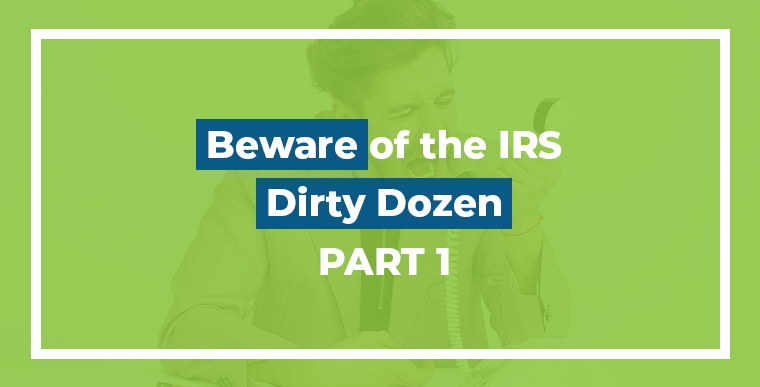
Taxes are a tremendous portion of the economy. If you think about it, New Yorkers pay between 1/5 and 1/3 of their income on average in taxes. Thought of another way, we work between 2.4 and 4 months of the year just to pay taxes.
It is no wonder then that unscrupulous individuals would see tax dollars as an easy target to try to and steal someone else’s hard-earned money. The IRS is highly aware of the many different scams that are out there and does a lot of work to try to warn and educate the public about them.
Every year, the IRS identifies the top 12 and releases a list dubbed the IRS Dirty Dozen. In this and next week’s article I will list a summary of each of these scams, to help you be more aware of them.
Remember, the IRS will never call, text or email asking you to verify or enter information. The IRS always initiates communication via mail.
- Employee Retention Credit Claims – Congress enacted the Employee Retention Tax Credit (ERTC) as a COVID-19 relief for business owners. The credit has complex rules and is worth potentially a lot of money for business owners. Businesses have opened just promoting this credit and they are making incorrect claims for business owners. Use a reputable accountant to figure your ERTC, don’t fall prey to the telemarketers on this one.
- Phishing and Smishing – Phishing is unsolicited emails and smishing is unsolicited text messages that look real and send you to a fake site asking you to enter personal information. Imagine you receive a text message that says “We were unable to process your tax refund due to an error in your bank information, click the link below to update your account information.” If you had recently filed your return and had not received the refund yet, you might fall prey to this one.
- Online Account Help – scammers offer to assist you in setting up your online irs.gov account and in the process, steal your personal information.
- False Fuel Tax Credit Claims – most taxpayers are not eligible for these credits, yet there are unscrupulous preparers claiming them on people’s returns. This credit is really intended for off-highway business and farming use.
- Fake Charities – scammers setup a fake charity and then when you donate they ask for personal identifying information so they can issue you a tax receipt.
- Unscrupulous Tax Return Preparers – The IRS requires tax return preparers to provide their PTIN number and sign tax returns that they prepare. When unscrupulous preparers prepare a tax return they will leave the preparer section blank, making it look like the return was self-prepared. An unscrupulous preparer can do many things including steal your personal information, direct your tax refund to the wrong account, charge you a fee based on the refund (which is not allowed), and more.
Even smart and educated people can fall victim to these scams. The more informed you are, the less likely you become a victim. If you want a reputable tax preparer that has your back, please contact my office and we can discuss how we provide personalized and reputable assistance with your unique tax situation.


